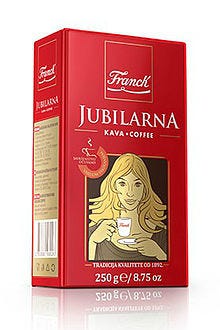
At this point, to say that Balkan people value coffee. Almost all of us have coffee bricks, or vacuum-packed kilograms of coffee, in our cabinets, even the few of us like me who don’t actually drink coffee. Coffee is not just a beverage, it is a gift. Showing up to someone’s house empty-handed is a sin, showing up without the requisite coffee brick is just as bad—it shows that you do not care about the tradition of your ancestors.
The standard gift in Croatia and most of the Balkans when visiting someone’s house is a pack of cookies, a liter of juice, and a brick of coffee, delivered in a gift bag you found on the shelf where you store all of the gift bags you received when other people visited you. This standard formula still leaves a lot of room to interpret individual choices. For example, you can tell a lot about a person by the brand of coffee they choose: someone who brings Barcaffe is cheap, the person with Lavazza has relatives in Italy and is a bit of a poser, and the rare person who brings artisanal coffee lives in Zagreb but has enough ties to the village to fear a grandmotherly dressing down for showing up somewhere without coffee. In Croatia, it’s best to stick to the classic Franck.
Coffee is more than coffee, it is a symbol of care. It is a shorthand way of thanking someone for inviting you into their home, and I think there’s something beautiful about having a universally agreed upon symbol for thanking your host. Its exchange at visits helps bind together family ties.
At least in my family, the coffee brick is also a symbol of gender inequality. The women in my family are the ones who remember that we have to bring the coffee brick, while the men are happy to just show up at someone’s house unannounced and empty-handed (my mom once had to explain to my dad it was rude to show up at a distant relative’s house without even a bar of chocolate for the kids—at Christmas, no less). They don’t have to worry about the reputation of their family because everyone will automatically blame the women for showing up empty-handed, and they don’t have to worry about any trouble their visit will cause the hostess. For many men, the coffee ritual is almost invisible. Even more progressive Balkan men in my circle who say they don’t partake because they think it’s outdated admitted that they have female relatives—mothers, sisters, and girlfriends—who actually take care of the coffee brick for them.
A very informal survey of other Balkan households (ie, a Twitter poll of my followers) showed that the gender balance of hospitality gifts is not quite as stark elsewhere as it is in my family, although it is still somewhat placed in the woman’s sphere. For male and female respondents, most said that they bring the gift when they go somewhere, although more men said they don’t bother compared to women. 34.2% of respondents said that any adults in their household who remember bring the coffee brick, showing its universality as a symbol of gratefulness. However, 60.5% of people said that mostly female relatives remembered to bring a housewarming gift when they go visit relatives.
Thinking about the coffee brick, I was reminded of Anne Helen Petersen’s essay, “The Mom Does It,” about how women are responsible for organizing recreational activities such as holidays and visits, and even sending out Christmas cards. To be fair, one thing I’ve noticed in Balkan culture is that maintaining family networks is not as exclusively a feminine coded activity as it is in the United States. My male relatives also call their relatives, organize gatherings, remember to visit graves, and even send Christmas cards (I know, the bar is on the floor). Men also remember the coffee brick.
However, most of this work of care and maintaining family networks does fall on women. It goes far beyond coffee bricks. If men leave something as simple as remembering to buy coffee bricks and pack them up to their wives, what about when maintaining kinship ties requires a bit more complexity, such as remembering that Great-Aunt Nina is sick so we should probably bring her some food in addition to the coffee brick?
These smaller symbols of care easily snowball into gendered divides in much larger responsibilities of caretaking. I can’t help but think about the care of elderly relatives. Like in many cultures, in the Balkans there is a strong taboo against turning to care homes or retirement facilities. I have female relatives who were shunned by their families and church communities after making the difficult decision to put an elder in a care facility, even when the elder’s medical needs were far too complex to manage at home. However, the burden of caretaking is almost exclusively borne by female offspring and relatives. The men are happy to brag about how they respect tradition and will take care of Old Mom at home without ever feeding Old Mom, changing her incontinence pads, or even sitting by her bedside, letting their wives, sisters, and daughters do all of their work.
A big aspect of patriarchy is the division of labor: who performs certain types of labor and whose labor gets valued. Caretaking is sometimes an emotionally fulfilling form of labor, but it is still labor.
It’s not a lot of work to buy and package a coffee brick. But as I said earlier, coffee means so much more.
